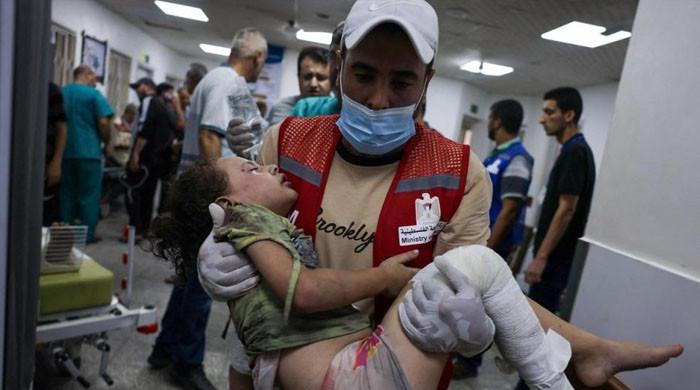- Aid convoy includes 20 trucks carrying medicine, medical supplies.
- Palestinians have no safe place to go as Israel urges evacuation.
- UN secretary-general toured checkpoint on Egypt’s side of border.
Israel has decided to escalate its bombing of Gaza to turn up the heat on Hamas, a military spokesman told reporters on Saturday — hours after the first international aid reached besieged Palestinian territory via Egypt’s Rafah border.
Since the Hamas attacks on Israel on October 7, which left 1,400 dead, Israel has launched devastating air and ground bombardments of Gaza. The Hamas authorities say 4,385 people have died.
Israel has also massed tens of thousands of troops and hundreds of tanks along the Gaza border for a widely anticipated ground invasion.
“We have to enter the next phase of the war in the best conditions, not according to what anyone tells us. From today, we are increasing the strikes and minimising the danger,” military spokesman Admiral Daniel Hagari told a press conference.
“Gaza is densely populated, the enemy is preparing a lot of things there — but we are also preparing for them,” Chief of Staff Lieutenant General Herzi Halevi told one infantry brigade on a visit.
First aid trucks arrive in Gaza
The first aid trucks loaded with humanitarian supplies arrived in southern Gaza on Saturday as Israel’s nightmarish siege entered its 12th day amid its saturation bombing that martyred scores of Palestinians overnight with war-torn people demanding a ceasefire instead of food.
US President Joe Biden had said this week that an agreement had been reached for 20 aid trucks to cross through Gaza’s Rafah border point with Egypt, and added on Friday he believed those first trucks would pass through within 48 hours.
Witnesses said aid trucks exited the crossing after checks and proceeded into Gaza’s southern area including the major towns of Rafah and Khan Younis where hundreds of thousands of people displaced by Israel’s unrelenting air war are sheltering.
Too little, too late
However, Palestinian officials were disappointed that fuel supplies were not included and added that the relief was only 3% of what used to get into Gaza in terms of medical and humanitarian aid before the crisis.
“Excluding the fuel from the humanitarian aid means the lives of patients and injured will remain at risk. Gaza hospitals are running out of the basic requirements to pursue medical interventions,” the Gaza health ministry said.
Israel’s “total siege” of Gaza after the October 7 cross-border attack on southern Israel by militants of the Islamist movement Hamas has left Gaza’s 2.3 million people running out of food, water, medicines and fuel.
The United Nations said the convoy included life-saving supplies that would be received and distributed by the Palestinian Red Crescent, with Hamas’ consent. Israel has warned that no aid should end up in Hamas’s hands.
UN officials say at least 100 trucks daily are needed to cover urgent, life-saving needs and that any aid operation must be sustainable at scale — a tall order now with Israel carrying out devastating bombardments of the enclave day and night.
‘No talks on captives until end of Israeli ‘aggression’
Hamas said on Saturday it won’t discuss the fate of Israeli army captives until Israel ends its “aggression” on the Gaza strip.
“Our stance with regards to Israeli army captives is clear: it’s related to a (possible) exchange of prisoners, and we will not discuss it until Israel ends its aggression on Gaza and Palestinians,” Hamas official Osama Hamdan, speaking from Lebanon, told a televised presser.
Israel pummelled the densely populated region despite Hamas releasing two American prisoners held in Gaza, providing a “sliver of hope” to desperate families.
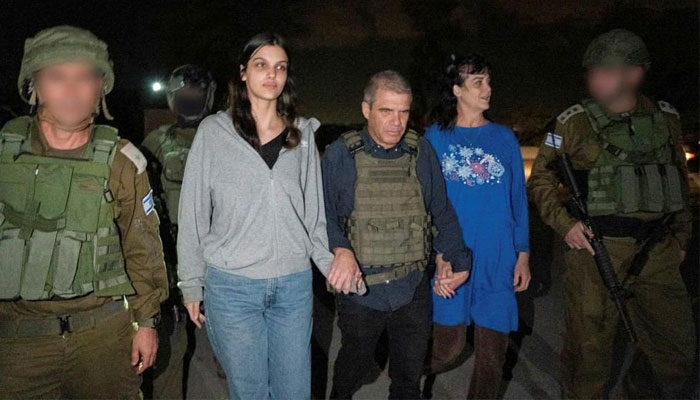
According to Israeli sources, Hamas fighters killed at least 1,400 people, largely civilians, and took more than 200 people captive when it surged into Israel from the Gaza Strip on October 7.
The release of mother and daughter Judith and Natalie Raanan provided a rare “sliver of hope” because the captives’ fate has remained unclear, according to Mirjana Spoljaric, head of the International Committee of the Red Cross.
Declaring himself “overjoyed” by the release, US President Joe Biden visited Israel a few days ago to show his support for the ally and to push for the entry of humanitarian aid into Gaza.
Israel has vowed to destroy Hamas and says around 1,500 of the group’s fighters were left dead in clashes before its army regained control of the area under attack on October 7.
Biden said Friday he believes the attack was motivated partly by Saudi Arabia’s plan to recognise Israel.
However, this full-blown land offensive carries risks, including hostages from Israel and around the world held by Hamas.
Humanitarian aid dependence
Egyptian state TV showed footage of Egypt opening the Rafah border in the Sinai Peninsula for humanitarian deliveries after days of waiting by over 200 aid trucks, with more relief stockpiled in the region.
The Israeli military said on Saturday that the aid entering Gaza would go only to southern areas where it has urged Palestinian civilians to congregate “as we continue to intensify strikes” in the north of the enclave.
‘Need ceasefire not food’
Terrified Palestinians who were forced to evacuate their homes after Israel’s deadly overnight bombings lashed out at the reports of aid trucks about to enter Gaza, saying it was a ceasefire and not food that they needed.
“They were asleep when the missile was dropped on them, innocent children, their father, their grandfather, what did they do? Did they fire rockets? Carried bullets? They are innocent children who did nothing!” cried one tearful woman.
“We have been fighting and the Arab nations are just watching. Canned food, is that the price of the Palestinian people who are offering sacrifices everywhere?”
Most of Gaza’s inhabitants depend on humanitarian aid. The heavily urbanised coastal strip has been under Israeli and Egyptian blockade since Hamas seized control of it 16 years ago, two years after Israel ended a 38-year occupation.
Before the outbreak of conflict, an average of about 450 aid trucks were arriving daily in Gaza.
Israel has told all civilians to evacuate the northern half of the Gaza Strip, which includes Gaza City. Many people have yet to leave saying they fear losing everything and have nowhere safe to go given that southern areas have also been bombarded.
The United Nations humanitarian affairs office said more than 140,000 homes – nearly a third of all homes in Gaza – had been damaged, with nearly 13,000 completely destroyed.
Hostages freed but violence continues
Two women, mother and daughter Judith and Natalie Raanan, who were held hostage by Hamas, were released but in spite of that, violence in Gaza continued overnight.
Abu Ubaida, a spokesman for Hamas’s armed wing Izz el-Deen al-Qassam Brigades, said the hostages were released in response to Qatari mediation efforts, “for humanitarian reasons, and to prove to the American people and the world that the claims made by Biden and his fascist administration are false and baseless”.
Despite the release of two hostages, Israeli aircraft struck six homes in northern Gaza early on Saturday, martyring at least eight Palestinians and injuring 45 Palestinians, media reported.
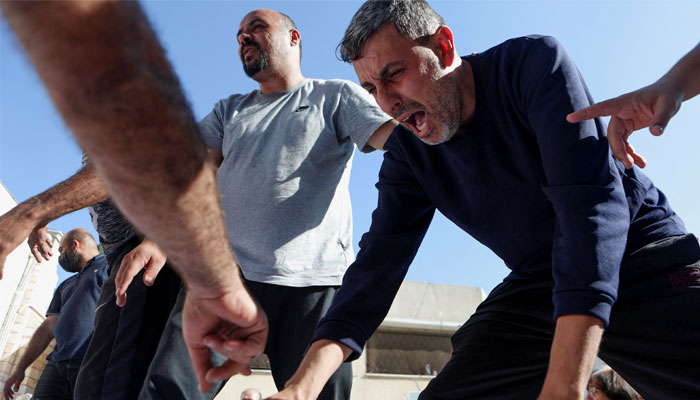
The Orthodox Patriarchate of Jerusalem, the main Palestinian Christian denomination, said that Israeli forces had struck the Church of Saint Porphyrius in Gaza City, where hundreds of Christians and Muslims had sought refuge.
Israel has already told all civilians to evacuate the northern half of the Gaza Strip, which includes Gaza City. Many people have yet to leave saying they fear losing everything and have nowhere safe to go with southern areas also under attack.
Asked if Israel had so far followed the laws of war in its response, US Secretary of State Antony Blinken reiterated on Friday that Israel has the right to defend itself and make sure Hamas is not able to launch attacks again, Reuters reported.
“It’s important that operations be conducted in accordance with international law, humanitarian law, the law of war… There will be plenty of time to make assessments about how these operations were conducted but I can just say from the part of the United States, this continues to be important to us,” he added
Israel vows to ‘fight until victory’
Israeli Prime Minister Benjamin Netanyahu vowed to “fight until victory” in Gaza, signalling no pause in his military’s bombardment and expected invasion of the enclave after Hamas released two US hostages.
They were the first hostages confirmed by both sides in the conflict to be freed since Hamas gunmen burst into Israel, killing 1,400 people, mainly civilians, and taking around 200 hostages.
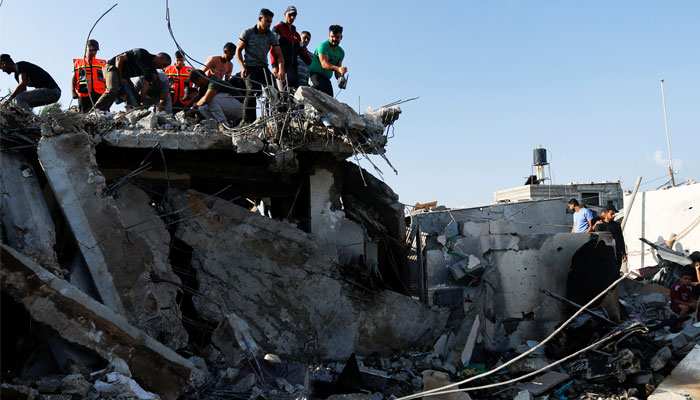
“Two of our abductees are at home. We are not giving up on the effort to return all abducted and missing people,” Netanyahu said in a statement released late Friday night.
“At the same time, we’ll continue to fight until victory,” he added.
Israel’s Defence Minister Yoav Gallant, speaking in front of a parliamentary committee, said achieving Israel’s objectives would not be quick or easy.
“We will topple the Hamas organisation. We will destroy its military and governing infrastructure. It’s a phase that will not be easy. It will have a price,” Gallant said.
He added that the subsequent phase would be more drawn out, but was aimed at achieving “a completely different security situation” with no threat to Israel from Gaza. “It’s not a day, it’s not a week, and unfortunately it’s not a month,” he said.
Israel-Saudi Arabia normalisation
President Biden on Friday suggested that the surprise attack by Hamas was aimed at disrupting a potential normalisation of ties between Israel and Saudi Arabia sought by Riyadh.
Biden suggested Saudi wanted to recognise Israel in the comments he made at a campaign fundraiser.
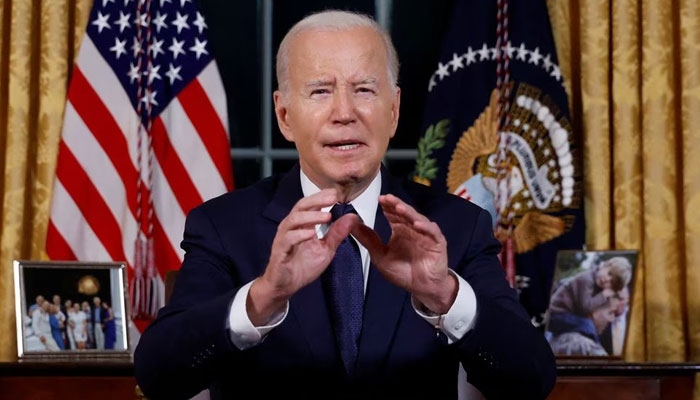
Riyadh has not followed suit, saying Palestinian statehood goals should be addressed first.
“One of the reasons Hamas moved on Israel … they knew that I was about to sit down with the Saudis,” Biden said. “Guess what? The Saudis wanted to recognise Israel.”
The potential normalisation of relations with Saudi Arabia and other Arab states was a top priority for Secretary of State Antony Blinken during his June trip to Riyadh, although he acknowledged no progress should be expected imminently.
Blinken told CNN on October 8 that “it wouldn’t be a surprise that part of the motivation (for the attack) may have been to disrupt efforts to bring Saudi Arabia and Israel together.”
Biden told CBS’ 60 Minutes in an interview that aired last Sunday that the prospect of normalisation was “still alive, it’s going to take time.”
A third of homes in Gaza damaged
The United Nations humanitarian affairs office said more than 140,000 homes — nearly a third of all homes in Gaza — have been damaged, with nearly 13,000 completely destroyed.
International attention has focused on getting aid to Gaza through the one access point not controlled by Israel, the Rafah crossing to Egypt.
UN Secretary-General Antonio Guterres toured the checkpoint on Egypt’s side on Friday and called for a meaningful number of trucks to enter Gaza every day and checks — which Israel insists on to stop aid reaching Hamas — to be quick and pragmatic.
Western leaders have so far mostly offered support to Israel’s campaign against Hamas, although there is mounting unease about the plight of civilians in Gaza.
Many Muslim states, however, have called for an immediate ceasefire, and protests demanding an end to the bombardment were held in cities across the Islamic world on Friday.

